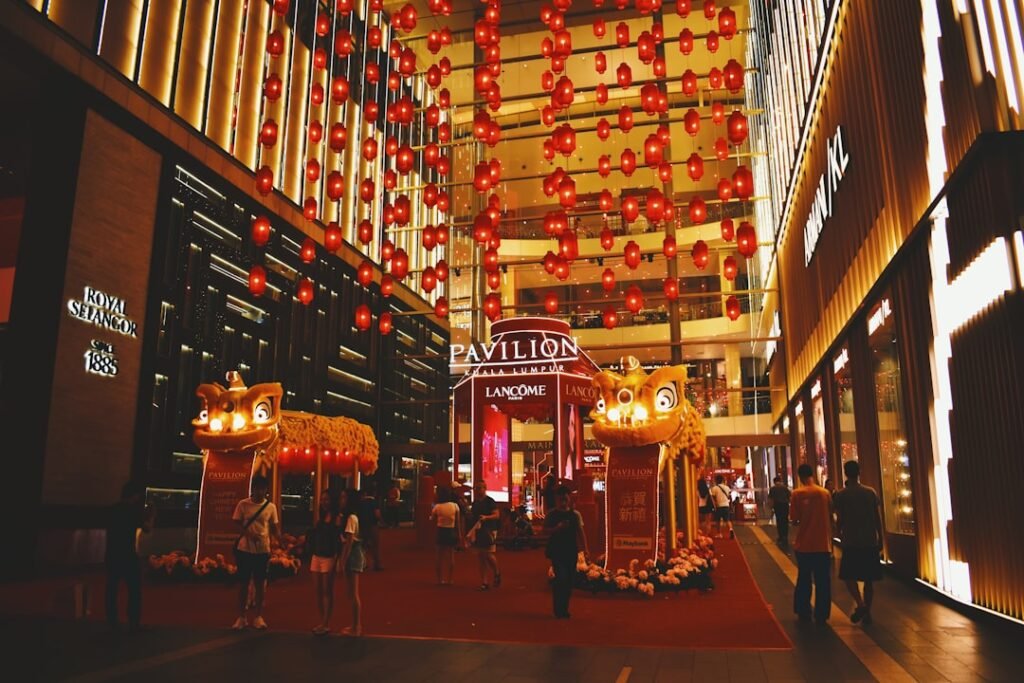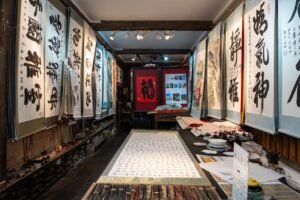Traditional Chinese festivals hold great importance in Chinese culture. These festivals are deeply rooted in history and are celebrated with great enthusiasm and joy by the Chinese people. They provide an opportunity for families to come together, honor their ancestors, and celebrate the rich cultural heritage of China.
Chinese festivals are not only a time for celebration but also a time for reflection and gratitude. They are a way for the Chinese people to connect with their roots, preserve their traditions, and pass them on to future generations. These festivals are marked by various customs and traditions that have been practiced for centuries, making them an integral part of Chinese culture.
Table of Contents
ToggleChinese New Year: The Most Celebrated Festival
Chinese New Year, also known as Spring Festival, is the most important and widely celebrated festival in China. It marks the beginning of the lunar calendar year and is a time for family reunions, feasting, and honoring ancestors.
The customs and traditions associated with Chinese New Year are rich in symbolism. Red decorations are hung to ward off evil spirits, firecrackers are set off to scare away bad luck, and lion and dragon dances are performed to bring good fortune. The festival is also known for its delicious food, such as dumplings and fish, which symbolize prosperity and abundance.
Family reunions play a central role during Chinese New Year. It is a time when family members from near and far come together to celebrate and spend quality time with one another. This tradition reinforces the importance of family bonds and filial piety in Chinese culture.
Mid-Autumn Festival: Celebrating the Harvest
The Mid-Autumn Festival, also known as the Moon Festival, is celebrated on the 15th day of the eighth lunar month. It is a time to give thanks for the harvest and pray for good fortune.
The origins of the Mid-Autumn Festival can be traced back to ancient times when people worshipped the moon as a symbol of fertility and abundance. The festival is marked by various customs and traditions, such as lighting lanterns, admiring the moon, and eating mooncakes.
Mooncakes are a traditional delicacy associated with the Mid-Autumn Festival. These round pastries are filled with sweet or savory fillings and are often given as gifts to family and friends. They symbolize unity and completeness, as the round shape represents the full moon.
Dragon Boat Festival: Honoring a Heroic Poet
The Dragon Boat Festival, also known as Duanwu Festival, is celebrated on the fifth day of the fifth lunar month. It commemorates the life and death of Qu Yuan, a famous poet and statesman from ancient China.
According to legend, Qu Yuan drowned himself in a river as an act of protest against political corruption. The local people tried to save him by racing their boats to find his body and throwing rice dumplings into the water to prevent fish from eating his remains.
To this day, dragon boat races are held during the festival to honor Qu Yuan’s memory. These races involve teams of rowers paddling in sync to the beat of a drum, while spectators cheer them on. The festival is also known for its traditional food, such as zongzi (rice dumplings) and realgar wine, which are believed to ward off evil spirits.
Qingming Festival: Paying Respects to Ancestors
The Qingming Festival, also known as Tomb-Sweeping Day, is a time for Chinese people to honor their ancestors by visiting their gravesites and paying their respects. It is celebrated on April 4th or 5th of each year.
The origins of the Qingming Festival can be traced back to ancient times when people believed that the spirits of their ancestors would return to the world of the living during this time. To ensure the well-being of their ancestors in the afterlife, people would clean their graves, offer food and drinks, and burn incense and paper money.
Tomb sweeping is a central tradition during the Qingming Festival. Families gather at the gravesites of their ancestors to clean the tombstones, remove weeds, and offer prayers. It is a solemn and reflective time for Chinese people to remember and honor their loved ones who have passed away.
Lantern Festival: Lighting Up the Night

The Lantern Festival marks the end of the Chinese New Year celebrations and is celebrated on the 15th day of the first lunar month. It is a time to light lanterns, solve riddles, and enjoy various cultural performances.
The origins of the Lantern Festival can be traced back to ancient times when people would light lanterns to worship the gods and pray for good fortune. Today, lanterns come in various shapes, sizes, and colors, and are often decorated with intricate designs and patterns.
During the Lantern Festival, people gather in parks or public spaces to admire lantern displays, solve riddles written on lanterns, and watch traditional performances such as lion dances and acrobatics. It is a joyful and festive occasion that brings communities together.
Double Seventh Festival: Celebrating Love and Romance
The Double Seventh Festival, also known as Qixi Festival or Chinese Valentine’s Day, is celebrated on the seventh day of the seventh lunar month. It is a time to celebrate love and romance.
The origins of the Double Seventh Festival can be traced back to a Chinese folktale about two star-crossed lovers, Zhinü (the Weaving Maid) and Niulang (the Cowherd). According to legend, they were separated by the Milky Way but were allowed to meet once a year on the seventh day of the seventh lunar month.
On this day, couples exchange gifts, go on romantic dates, and pray for a happy and lasting relationship. It is also a time for single people to pray for love and find their soulmates. The festival is marked by various customs and traditions, such as making and displaying colorful paper decorations, writing love poems, and releasing lanterns into the sky.
Chongyang Festival: Honoring the Elderly
The Chongyang Festival, also known as Double Ninth Festival, is celebrated on the ninth day of the ninth lunar month. It is a time to honor and respect the elderly.
The origins of the Chongyang Festival can be traced back to ancient times when people believed that the number nine was associated with yang energy, which represents positivity and vitality. To ward off evil spirits and bring good fortune, people would climb mountains, wear dogwood leaves, and drink chrysanthemum wine.
Today, the Chongyang Festival is celebrated by visiting elderly relatives, climbing mountains, and participating in various outdoor activities. It is a time to show gratitude and appreciation for the wisdom and guidance of the older generation.
Laba Festival: Enjoying Porridge and Giving Thanks
The Laba Festival is celebrated on the eighth day of the twelfth lunar month. It is a time to give thanks for the harvest and enjoy Laba porridge, a traditional dish made from mixed grains and beans.
The origins of the Laba Festival can be traced back to ancient times when people would offer sacrifices to the gods to pray for a bountiful harvest. Over time, this tradition evolved into a festival where people would cook Laba porridge and share it with family, friends, and neighbors.
Laba porridge is made by boiling mixed grains and beans with sugar or honey. It is believed to bring good luck and prosperity for the coming year. During the festival, people also participate in various religious activities, such as visiting temples, making offerings to deities, and praying for blessings.
Vocabulary for Celebrating Traditional Chinese Festivals
Here is a list of common vocabulary words and phrases associated with traditional Chinese festivals:
1. 春节 (chūn jié) – Chinese New Year
2. 元宵节 (yuán xiāo jié) – Lantern Festival
3. 中秋节 (zhōng qiū jié) – Mid-Autumn Festival
4. 端午节 (duān wǔ jié) – Dragon Boat Festival
5. 清明节 (qīng míng jié) – Qingming Festival
6. 七夕节 (qī xī jié) – Double Seventh Festival
7. 重阳节 (chóng yáng jié) – Chongyang Festival
8. 腊八节 (là bā jié) – Laba Festival
Each word or phrase has its own unique meaning and usage. For example, 春节 (chūn jié) is used to refer to the Chinese New Year, which is the most important festival in China. 元宵节 (yuán xiāo jié) is used to refer to the Lantern Festival, which marks the end of the Chinese New Year celebrations.
Understanding these vocabulary words and phrases can help you better understand and participate in traditional Chinese festivals. It allows you to communicate with native speakers and engage in cultural activities with a deeper appreciation for their significance.
Traditional Chinese festivals hold great cultural significance and are an integral part of Chinese culture. They provide an opportunity for families to come together, honor their ancestors, and celebrate the rich cultural heritage of China.
Chinese New Year, Mid-Autumn Festival, Dragon Boat Festival, Qingming Festival, Lantern Festival, Double Seventh Festival, Chongyang Festival, and Laba Festival are just a few examples of the many traditional Chinese festivals celebrated throughout the year. Each festival has its own unique customs and traditions that reflect the values and beliefs of the Chinese people.
By learning about and participating in these festivals, we can gain a deeper understanding of Chinese culture and foster cross-cultural appreciation. So, let’s embrace the spirit of these festivals and celebrate the rich cultural heritage of China.
If you’re interested in learning more about traditional Chinese festivals and expanding your vocabulary to celebrate them, you may also enjoy reading this related article on the LC Chinese School website: “10 Benefits of Having an Internship in China.” This article explores the advantages of gaining work experience in China, including cultural immersion and language acquisition. By participating in an internship, you can deepen your understanding of Chinese traditions and festivals while also enhancing your professional skills. Check out the article here.








